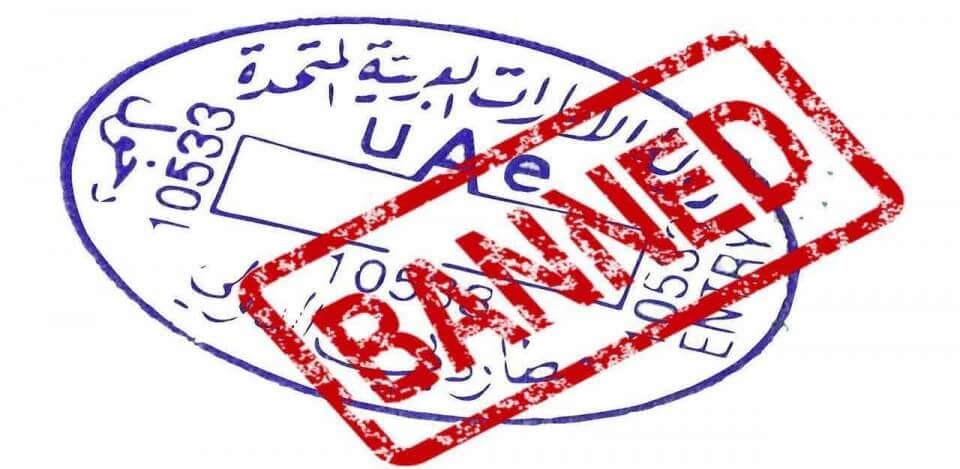Have you failed on a bank loan or are you facing legal action in the UAE? If this is the case, you may be concerned if you have been placed under a travel ban.
For a variety of reasons, UAE authorities may impose a travel ban on a person, preventing them from entering or exiting the nation. A travel ban may be imposed for administrative reasons – by executive organizations such as the Federal Authority for Identity, Citizenship, Customs and Ports Security (ICP) – or for judicial grounds when a court has placed limitations on an individual’s travel.
But, what are the many scenarios in which you can be subjected to a travel ban? Check it out.
1. Visa overstay
If you have overstayed your visa and are facing deportation, you will be subjected to a travel ban once you depart the country.
When a decision to prohibit travel is made, the UAE authorities issue a directive to all of the country’s border crossings, preventing the individual in question from entering or departing the country. Furthermore, because the UAE government already obtains the individual’s details online, this decision does not necessitate the authority having custody of the person’s passport.
2. Absconding case
If your employer has filed an absconding case against you for failing to report to work, you may also be subject to a travel ban.
If you don’t show up for work for seven days in a row, your employer has the right to file an absconding case or an Unexpected Work Abandonment (UWA) report against you, according to UAE labour law. Only the sponsor has the authority to lift the ban. Alternatively, if you can convince the Ministry of Human Resources and Emiratisation (MOHRE) that the absconding case is invalid, the Ministry may revoke your travel ban.
3. Defaulting on a bank loan
When it comes to defaulting on a bank loan or failing to pay credit card bills, a travel ban may be imposed either because your security check bounced or because the bank is demanding full payment.
If you gave a security cheque for Dh10,000 for your credit card, but the card limit was later increased to Dh50,000 and you used up the entire credit limit, the bank may try to encash the security cheque, which would be a case of bounced cheques, or claim payment of the full amount of Dh50,000 in court.
Even though bounced checks are no longer a criminal offense, you could still face civil charges.
4. Late on your rent
If you do not pay your rent on time, or if your landlord has sent you a notice for non-maintenance of the property or for failing to renew your lease, he or she may file a complaint with the Rental Dispute Centre (RDC).
In that instance, the RDC will impose a travel ban on you and require you to pay your rent and fulfill any other obligations you have as a renter.
5. You have a criminal case against you
In criminal instances, you may be subject to a travel ban if a police investigation or court case is continuing, which means you may not be permitted to leave the country.
After a criminal complaint is filed, the administrative body may issue a circular prohibiting a person from traveling until the complaint or case is ultimately resolved and the judgment is implemented.
In addition, if you are convicted of a significant criminal offense, such as drug use or assault, and are deported, you may be subjected to a travel ban, which prevents you from returning to the UAE following your deportation.
After a criminal complaint is filed, the administrative body may issue a circular prohibiting a person from traveling until the complaint or case is ultimately resolved and the judgment is implemented.
6. In some civil or commercial cases
In some civil cases, such as commercial lawsuits involving the non-payment of dues by a firm or family court proceedings involving a guardianship dispute, a court may impose a travel ban on you.
If you are the manager of a Limited Liability Company (LLC) that has defaulted on payments or the owner of a sole proprietorship that has a lawsuit against it for non-payment of dues, you may be subject to a travel ban.
If the commercial lawsuit is against an LLC, the manager may face a travel ban. The manager will be barred from traveling until he submits a report to the execution court that includes the company’s cash flow figures as well as proof that the company is unable to pay its debts. If the lawsuit involves a sole proprietorship, the owner will be barred from leaving the country till the debt is paid or he or she is found insolvent by a court order.
Similarly, according to the UAE government’s official website – u.ae – either parent in a custody case can acquire a travel ban barring the child from leaving the airport if they are concerned that the other parent may exit the country with the child. If there is a disagreement, the case can be taken to a judge.
7. You stood as a guarantor for someone
If you have acted as a guarantor for a family member or relative who is facing a police or court case, you will be unable to travel during the period you are acting as a guarantor. While your passport may be held by the police or the court in most situations, even if it is still with you, you will be subject to a travel ban while serving as a guarantor.
When a decision to prohibit travel is made, the UAE authorities issue a directive to all of the country’s border crossings, preventing the individual in question from entering or departing the country. Furthermore, because the UAE government already obtains the individual’s details online, this decision does not necessitate the authority having custody of the person’s passport.
